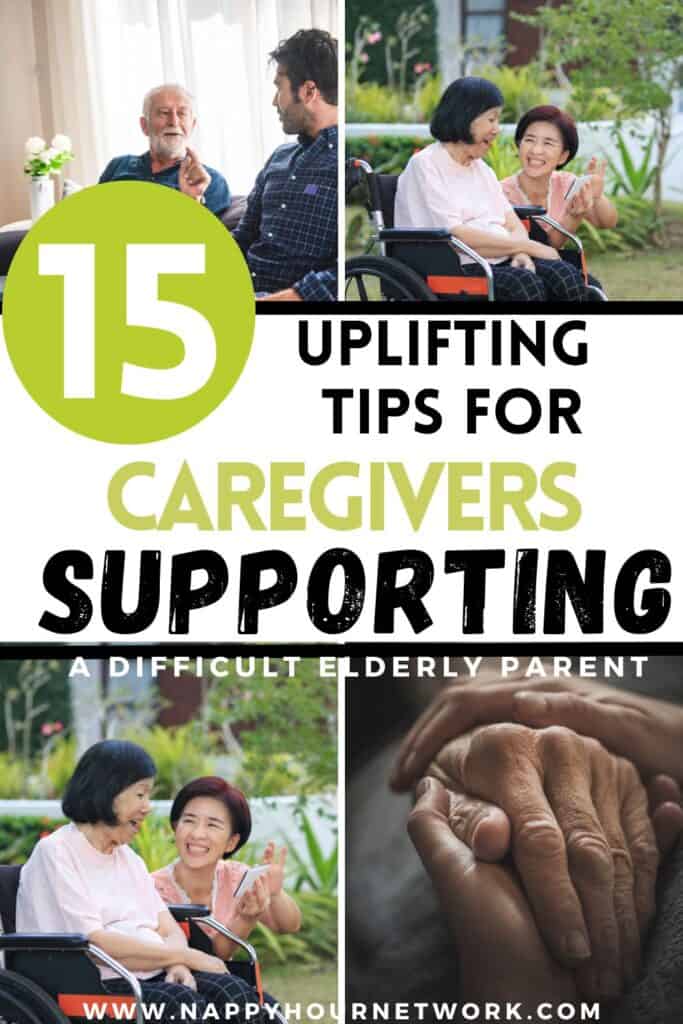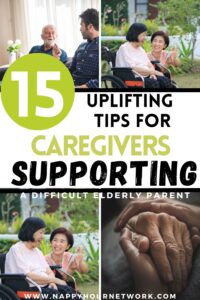As our parents age, we often face new challenges that affect our relationships with them such as when your elderly mother is mean. One common and emotionally difficult situation is dealing with an elderly mother who seems mean, irritable, or aggressive. Whether this behavior is sudden or has developed over time, it can be a source of frustration and confusion for adult children. Understanding the underlying causes and learning strategies to cope can make this journey more manageable for both you and your aging parent.
*This post includes affiliate links, which means if you make a purchase through one of these links, I earn a small commission at no extra cost to you. This helps me keep providing high-quality content on this site for free. Rest assured, I only recommend products that I would personally use and believe will be helpful for my readers.
Understanding Why My Elderly Mother Is Mean? Coping with Aging Parent Behavior
In this article, we’ll explore why elderly mothers can seem mean, common causes of these personality changes, and provide practical solutions for handling difficult behavior. We’ll also cover essential tips on seeking professional help, managing your own emotional health, and setting boundaries with an elderly parent.
Why an Elderly Mother Is Mean: Or Seem Mean
Common Causes of Personality Changes in Older Adults
Aging brings a variety of changes, many of which can impact a person’s behavior and emotional state. If your elderly mother seems mean, it’s important to understand that several factors could be at play. Some common causes include:
- Cognitive Decline: One of the most significant contributors to changes in personality is cognitive decline. Conditions like Alzheimer’s disease or dementia can alter the way an elderly person thinks, feels, and interacts with others. Confusion, memory loss, and difficulty processing information can result in frustration, leading to outbursts or what seems like mean behavior.
- Mental Health Issues: Aging parents may also suffer from mental health conditions like depression or anxiety. These conditions often go unnoticed, as they manifest differently in older adults than they do in younger people. Your mother may not openly talk about feeling sad, but instead, may become more irritable or withdrawn.
- Chronic Pain and Physical Health: Chronic pain or declining physical health can also contribute to irritability. Physical discomfort that limits mobility or independence may cause your mother to lash out, particularly when she’s feeling vulnerable or dependent.
- Medication Side Effects: Many elderly people are on multiple medications, and these can sometimes have side effects that impact mood and behavior. For example, certain medications for high blood pressure, anxiety, or sleep disorders can make an older adult more prone to agitation or anger.
Statistics: According to the Alzheimer’s Association, nearly one in 10 adults over the age of 65 has Alzheimer’s disease, which is a leading cause of personality changes in elderly parents.
The Emotional Toll of Aging and Loss of Independence
Aging often comes with the loss of independence, which can have a profound emotional impact on older adults. Your mother may feel frustrated as she loses the ability to drive, care for herself, or make decisions without help. These feelings of loss can manifest as anger or meanness.
- Loss of Social Connections: As elderly parents age, they may lose friends or spouses, leading to feelings of isolation and grief. This can increase irritability or contribute to negative behavior toward family members.
- Loss of Identity: If your mother once prided herself on being independent or taking care of others, she may now feel like a burden, further increasing feelings of frustration and anger.
Case Study: Mary, a 75-year-old widow, became increasingly mean toward her adult children after moving into a retirement community. Though she had once been an active socializer, she now felt isolated and angry, often lashing out at her family during visits. After working with a therapist, Mary was able to come to terms with her loss of independence and began to reconnect emotionally with her family.
Recognizing Signs of Cognitive or Emotional Decline
Early Signs of Dementia and Cognitive Decline
It’s important to recognize when your elderly mother’s behavior is due to cognitive decline, which can make it harder for her to control her emotions or behavior. Early signs of dementia include:
- Memory Loss: Forgetting names, dates, or familiar places.
- Confusion: Becoming confused about time, place, or people.
- Personality Changes: A typically kind or quiet person may suddenly become argumentative, aggressive, or withdrawn.
These signs often worsen over time, and it’s crucial to consult a medical professional if you suspect your mother is experiencing cognitive impairment.
Mental Health Concerns in Aging Parents
Mental health issues such as depression or anxiety are also common in elderly parents, but they often go unnoticed or untreated. Symptoms to watch for include:
- Withdrawal from Social Activities: Avoiding friends, family, or activities once enjoyed.
- Mood Swings: Rapid shifts in mood, from sadness to anger or irritability.
- Sleep Disturbances: Difficulty sleeping or changes in sleep patterns.
Statistics: Depression affects 15-20% of adults over the age of 65, but many go untreated due to the stigma or lack of awareness of mental health issues in older adults.
Coping Strategies for Dealing with if Elderly Mother is Mean
Set Boundaries and Protect Your Emotional Health
When dealing with a difficult elderly parent, it’s crucial to set boundaries to protect your own emotional well-being. This can be challenging, especially if you feel guilty about not being more patient or accommodating. However, setting limits can prevent emotional burnout.
- Manage Expectations: Understand that your elderly mother may not be able to change her behavior entirely, and adjust your expectations accordingly.
- Protect Your Time and Energy: It’s okay to limit the amount of time you spend with your mother if interactions are consistently negative. Prioritize self-care.
Seek Professional Help
If your mother’s behavior becomes too difficult to manage, it may be time to seek professional help. Consulting with primary care doctors, geriatric specialists, or mental health professionals can help identify underlying issues, such as dementia or depression.
- Therapy: A family therapist can help mediate conflicts and teach communication strategies to better navigate challenging relationships.
- Medical Evaluation: A geriatric specialist can evaluate your mother for cognitive decline, mental health issues, or medication side effects.
Case Study: A family therapist helped the Smith family navigate their elderly mother’s aggressive behavior, providing coping mechanisms and facilitating better communication between family members.
Support Networks and Caregiver Resources
Caregiving can be emotionally and physically exhausting. Seek out support networks and caregiver resources, such as:
- Respite Care: Temporary care services that provide family caregivers with much-needed breaks.
- Support Groups: Local or online groups where caregivers can share experiences and advice.
External Resource: The Alzheimer’s Association offers support groups and resources for family caregivers dealing with dementia-related behavioral changes.
How to Address Abuse and Aggressive Behavior
Recognizing Verbal and Emotional Abuse
Sometimes, an elderly mother’s behavior crosses into verbal or emotional abuse. It’s important to recognize this and take steps to protect yourself. Signs of verbal abuse include:
- Name-calling or Insults: Harsh, demeaning language directed toward you.
- Accusations: False accusations or attempts to manipulate through guilt.
While cognitive decline may explain some of this behavior, it’s essential to set boundaries to prevent ongoing harm to your emotional health.
Legal and Financial Steps to Protect Yourself
If your mother’s behavior becomes abusive or financially irresponsible, you may need to take legal steps to protect both yourself and her assets.
- Power of Attorney: Consider obtaining power of attorney to manage your mother’s financial and medical decisions if she is no longer capable.
- Financial Advisor: Work with a financial advisor to ensure your mother’s financial needs are met without compromising her security.
Case Study: After her elderly mother started making large, impulsive financial decisions, Jane sought legal advice to establish power of attorney and protect her mother’s finances.
Caring for an elderly mother who displays mean or aggressive behavior can be one of the most emotionally challenging experiences for adult children, particularly for those who are balancing their own careers, raising their children, and managing a household. The “sandwich generation,” those in their 30s or 40s who are simultaneously caring for their own kids while also looking after aging parents, faces a unique set of pressures. When caregiving involves managing difficult behavior, it can feel even more overwhelming.
In this section, we’ll explore evidence-based strategies to handle difficult behavior while maintaining your emotional well-being and that of your family. We’ll discuss practical solutions to common issues like caregiver burnout, the importance of building a support system, and how to manage the emotional toll of caregiving with empathy and compassion.
Balancing Caregiving with Raising Children: Finding Stability
For those caring for both young children and elderly parents, time and energy are often stretched thin. It’s not uncommon for family caregivers to experience guilt as they juggle multiple responsibilities. This can be especially challenging when your elderly mother is mean or uncooperative, which can feel like a personal attack. It’s essential to recognize that her behavior is likely due to cognitive issues, physical discomfort, or emotional stress, rather than a reflection of how she feels about you.
Here are some tips to help find balance:
- Delegate Tasks Where Possible: Trying to “do it all” is a fast track to caregiver burnout. Consider delegating tasks both at home and in your caregiving duties. For example, involve other family members, or if financially feasible, hire help—whether it’s professional caregiving services for your mother or a babysitter for your children.
- Set Realistic Expectations: Caregiving for an elderly parent and young children often leads to unrealistic expectations. Be kind to yourself by setting realistic goals for what you can achieve each day, and accept that there will be days when not everything gets done.
- Establish Routines: Structure helps both children and elderly parents. Setting predictable daily routines can reduce stress for your elderly mother and help her feel more secure, reducing opportunities for outbursts or mean behavior. Similarly, children benefit from routines that bring a sense of normalcy, even during stressful times.
- Communicate Openly with Your Children: Your kids might notice Grandma’s behavior changing and feel confused or upset. Take the time to explain to your children that Grandma is struggling with aging and doesn’t mean to be mean. Help them understand that her behavior is not about them, and encourage them to maintain a compassionate attitude.
Preventing Caregiver Burnout: Prioritizing Your Mental and Physical Health
Caregiver burnout is a real risk for adult children providing full-time care for an elderly parent, particularly those who have additional family responsibilities as well as experieincing an elderly mother is mean. Burnout can lead to feelings of anger, frustration, sadness, and even resentment. It’s critical to take preventive steps to protect your emotional well-being while caring for your mother.
Try this book
Signs of Caregiver Burnout
Recognizing the symptoms of burnout early can help you take action before it becomes unmanageable. Common signs of caregiver burnout include:
- Chronic exhaustion, both physical and emotional.
- Irritability or frustration, often directed toward your elderly parent or your children.
- Feelings of hopelessness, guilt, or resentment.
- Withdrawal from social activities and relationships.
- Frequent headaches, illness, or sleep disturbances.
Tips for Preventing Burnout
- Take Breaks: It may seem impossible to take a break, but it’s essential for your mental and physical health. If family members are unable to step in, consider respite care services that provide temporary relief for caregivers. This could mean hiring in-home care for a few hours a week or using adult day care services.
- Practice Self-Care: Prioritize self-care, whether it’s as simple as taking a daily walk, practicing meditation, or spending time on a hobby that you love. Self-care is not selfish—it’s a vital part of being able to continue caring for others.
- Join a Support Group: Joining a caregiver support group, whether in-person or online, can offer emotional relief. Speaking with others who are facing similar challenges can be incredibly validating, and support groups often offer practical advice on managing difficult situations.
- Seek Professional Help: If you’re struggling emotionally, consider talking to a therapist who specializes in caregiver stress or eldercare. A therapist can help you develop coping strategies and provide emotional support, especially if you’re dealing with feelings of guilt, frustration, or sadness.
Research Insight: According to the Family Caregiver Alliance, caregivers for individuals with Alzheimer’s or dementia are more likely to experience high levels of stress and anxiety. Roughly 40-70% of family caregivers report significant symptoms of depression, a clear indicator that seeking support is critical for long-term well-being.
Practical Strategies for Managing Difficult Elderly Behavior
When faced with an elderly mother who is exhibiting mean or aggressive behavior, it can feel overwhelming, but there are practical ways to manage these situations. Often, the key is understanding the triggers for the behavior and responding in a calm, non-reactive way.
De-Escalation Techniques
In moments when your mother is being mean or verbally aggressive, the goal is to de-escalate the situation rather than react emotionally. Here are some strategies:
- Stay Calm: If your mother is acting out, responding with anger or frustration will only escalate the situation. Take a deep breath, remain calm, and speak softly. This can help defuse her anger or agitation.
- Redirect Attention: If your mother is upset about something minor, try gently redirecting her attention to another activity or subject. For example, if she’s angry because she misplaced something, offer to help find it while asking her about a topic she enjoys.
- Don’t Take It Personally: It’s important to remember that your mother’s mean behavior is likely a symptom of something deeper, such as cognitive impairment, physical discomfort, or emotional distress. Avoid interpreting her words as personal attacks, even if they hurt.
- Use Empathy: Express empathy toward your mother’s struggles. You might say, “I know this is frustrating for you, and I’m here to help.” This can calm her down and reinforce that you’re on her side.
Addressing Underlying Health Issues
Mean behavior in elderly parents can often be a result of undiagnosed or poorly managed health issues. Cognitive decline, depression, anxiety, and chronic pain are common culprits. Working closely with healthcare providers to ensure your mother’s medical needs are met can lead to significant improvements in her mood and behavior so you can try to eliminate experiencing if your elderly mother is mean.
- Schedule Regular Medical Checkups: Ensure your mother is regularly evaluated by her primary care doctor. Discuss any changes in her behavior, as they may suggest issues like cognitive impairment, depression, or the need to adjust medications.
- Work with a Geriatric Specialist: Geriatric doctors specialize in the unique needs of older adults, including managing multiple medications and addressing age-related health concerns. They can provide valuable insight into behavior changes and recommend treatments to improve your mother’s quality of life.
Research Insight: Studies have shown that treating underlying medical conditions like chronic pain or depression in elderly adults can significantly reduce symptoms of irritability and aggression. Proper pain management and mental health treatment are key to improving the emotional well-being of older adults.
Encouraging Connection and Social Engagement
Social isolation is a major issue for elderly adults, and it can contribute to negative behavior like if your elderly mother is mean. Encouraging your mother to maintain social connections can improve her mood and reduce feelings of loneliness, which may be contributing to her mean or aggressive behavior.
Ways to Foster Social Connection
- Encourage Participation in Senior Activities: Many communities offer senior centers that provide social activities, classes, and outings for older adults. These centers allow your mother to engage with peers and participate in activities that bring joy.
- Schedule Regular Visits with Friends and Family: Ensure that your mother has regular interactions with friends, relatives, or even her grandchildren. You can set up phone calls, video chats, or short visits to help her feel more connected.
- Consider a Retirement Community: If your mother is particularly isolated and struggles with living alone, a retirement community may provide a positive environment with built-in social opportunities. Many retirement communities offer social programs and activities designed to engage older adults in meaningful ways.
Research Insight: A report from the National Institutes of Health highlights that social isolation and loneliness in older adults can increase the risk of mental health disorders like depression and anxiety. Engaging elderly individuals in social activities has been shown to improve their overall mood and reduce feelings of isolation.
Empowering Yourself as a Caregiver
Caring for a mean elderly mother is undoubtedly challenging, but it’s important to recognize the strength and resilience you bring to this role. As an adult child, you may feel overwhelmed, but your dedication and love make a significant difference in your mother’s life, even when she isn’t able to show gratitude or appreciation.
Acknowledge Your Efforts
It’s essential to take moments to reflect on the important role you’re playing. Remind yourself that you are doing your best in a difficult situation. Acknowledge that it’s okay to have tough days, and it’s okay to ask for help when you need it.
Celebrate Small Wins
In caregiving, progress can be slow and subtle. Celebrate small victories, whether it’s a day when your mother is calm or a moment when you feel a connection despite the challenges. These moments can serve as reminders of the love and care you’re providing.
Remember You Are Not Alone
Finally, remember that many people in their 30s and 40s are facing similar challenges, navigating the complexities of caring for children while supporting an elderly mother is mean. Reaching out to others who understand your experience can provide comfort and perspective during difficult times as you experience your elderly mother is mean. You may have an older parent, but also juggling a full-time job and young children. The best thing is to prioritize your emotional needs so that you can do your best to do the right thing for you and your family. The good news is that there are more resources from caregiving expert all around the world that you can point to gain insights from professional caregiver networks.
In conclusion, managing a mean elderly mother requires patience, empathy, and resilience. By practicing self-care, building a support network, and using practical strategies to address difficult behavior, you can create a more harmonious environment for both your mother and your family. You are doing valuable, compassionate work—and your efforts truly matter.
Finding Peace and Moving Forward
If an elderly mother is mean, dealing with it can be emotionally draining, but understanding the underlying causes of her behavior and taking steps to protect your mental health can make the process easier. Whether through setting boundaries, seeking professional help, or connecting with support networks, there are resources available to help you cope and maintain your relationship.
15 encouraging tips for caregivers:
If you are struggling with an elderly mother is mean, or another elder, remember these encouraging tips for caregivers.
- Prioritize Self-Care: Taking care of yourself is essential for taking care of others. Ensure you’re setting aside time for rest, exercise, and relaxation, even if it’s just a few minutes a day.
- It’s Okay to Ask for Help: You don’t have to do everything on your own. Whether it’s asking family, friends, or professional caregivers, accepting help can ease the burden.
- Celebrate Small Wins: Focus on the little victories, like a calm conversation with your loved one or a day that goes smoothly. Every win is progress.
- Remember You’re Making a Difference: Your hard work and care may not always be recognized, but you are making an invaluable impact on your loved one’s life every single day.
- Find Joy in the Present: Cherish the small moments of joy, laughter, or connection. They can be a source of strength when things get tough.
- Stay Organized to Reduce Stress: Keeping track of appointments, medications, and schedules can help reduce anxiety and ensure you’re prepared for each day.
- Don’t Feel Guilty for Taking Breaks: It’s okay to step away for a while. Breaks allow you to recharge and come back stronger, and they make you a better caregiver.
- Build a Support Network: Surround yourself with supportive people, whether it’s family, friends, or a caregiver support group. Sharing your feelings and experiences can lighten the emotional load.
- Practice Patience with Yourself: You’re doing your best, and that’s enough. Don’t be too hard on yourself when things don’t go perfectly.
- Be Open to Learning: Caregiving is a journey. Be open to new approaches, techniques, and advice that can make caregiving easier for both you and your loved one.
- Create Boundaries: It’s important to set emotional and physical boundaries to prevent burnout. It’s okay to say no when you need a break.
- Stay Connected with Friends: Maintaining relationships outside of your caregiving role can provide emotional balance, fun, and perspective.
- Acknowledge Your Emotions: Caregiving comes with a range of emotions—joy, frustration, love, sadness. Acknowledge your feelings, and don’t be afraid to express them.
- Use Humor as a Tool: Finding humor in challenging situations can be a powerful way to cope. Laughter can lighten the emotional load and help you stay resilient.
- Remind Yourself That You’re Not Alone: Many caregivers face similar challenges. You’re part of a larger community of people showing up every day for their loved ones.
FAQ Section
- What should I do if my elderly mother is verbally abusive?
- It’s important to set firm boundaries and seek support, whether through therapy or caregiver support groups. Don’t hesitate to reach out to a legal professional if needed.
- How do I know if my elderly mother’s behavior is due to dementia?
- Watch for signs like memory loss, confusion, and personality changes. A medical evaluation can confirm cognitive decline or dementia.
- What resources are available to support family caregivers?
- Organizations like the Alzheimer’s Association and AARP offer caregiver support groups, respite care options, and educational resources.
- Can a difficult elderly mother change her behavior?
- While cognitive or health-related changes may make permanent behavior change difficult, therapy and medical intervention can help manage symptoms and improve family dynamics.
- When should I seek legal help for my elderly parent’s aggressive behavior?
- If your parent’s behavior is putting you or themselves at risk financially or physically, it may be time to consult with a lawyer about power of attorney or other legal protections.












